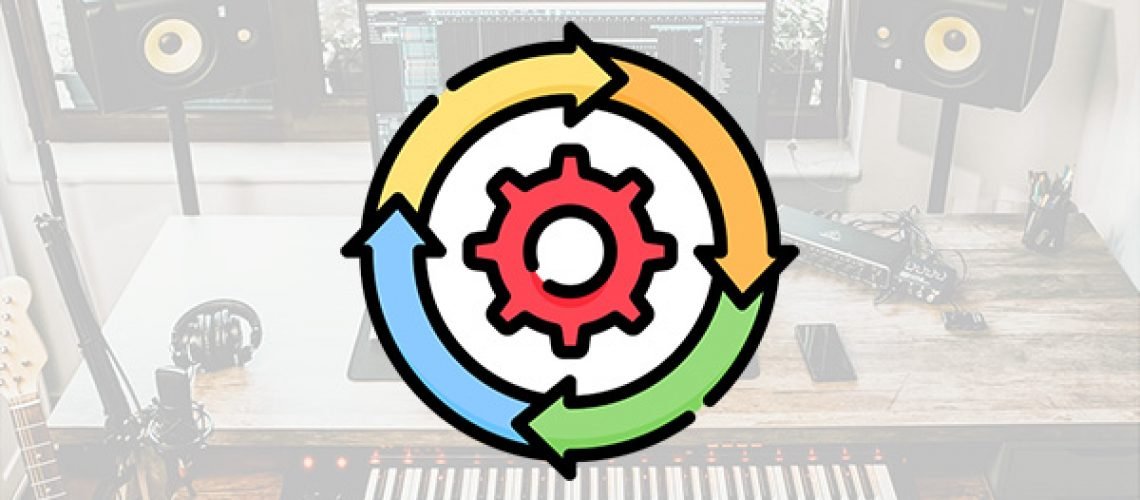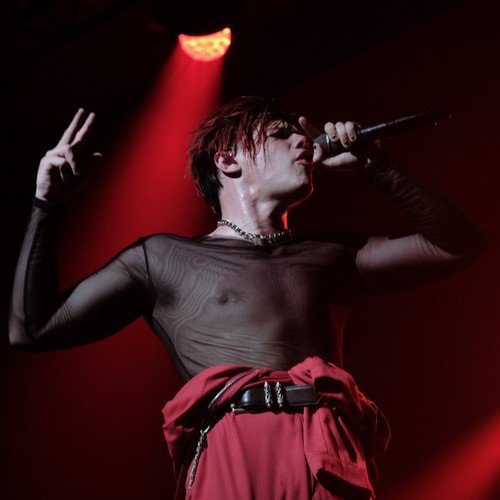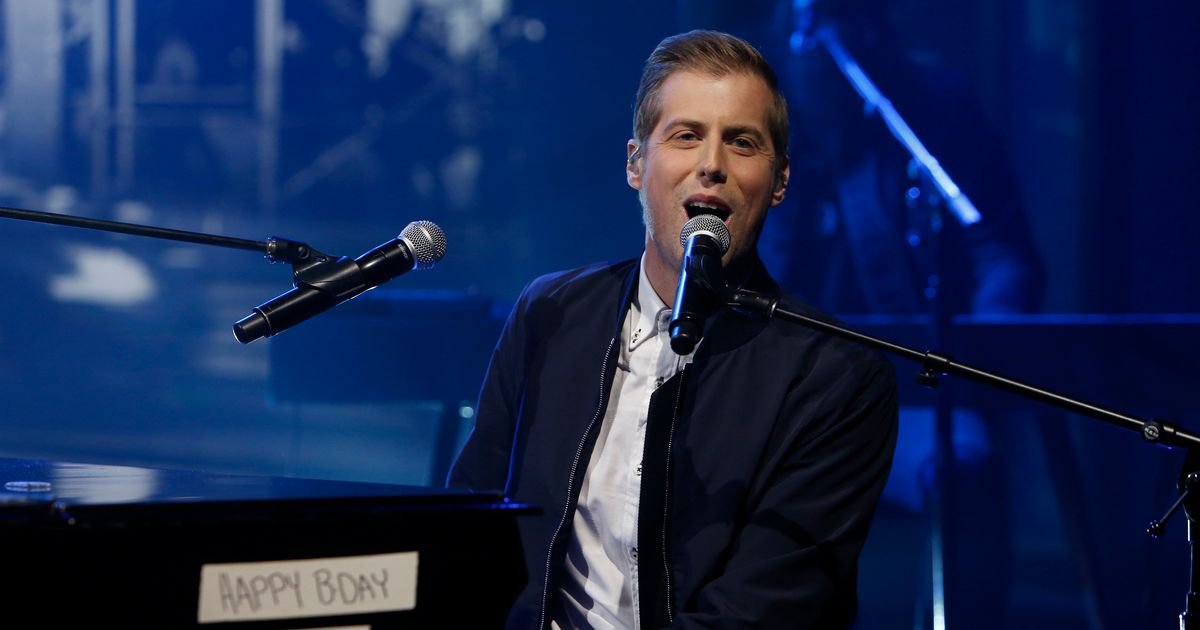Learn how using smart home devices can help you produce music faster, protect your gear, and streamline your workflow.
To dive into the world of home studio automation, I recommend that you start by getting an Amazon Echo speaker like an Echo Dot or Echo Show. These devices are both smart speakers but the Echo show has a built-in screen whereas the Echo Dot does not.
Download Now: 8 Steps to Producing Radio-Quality Songs [FREE Checklist]
An Echo speaker will allow you to communicate with Alexa, which is the Amazon equivalent of Siri but with home automation abilities. You can tell Alexa to run routines using your voice, which do things like turn the lights on or off in your studio, assuming you’re using smart Wi-Fi light bulbs.
I’m obsessed with home automation. Initially, I was looking for a simple way to turn my living room light on at sundown. As soon as I realized the potential that home automation had in my studio, I was able to speed up the rate at which I produce music, record YouTube videos, and interact with my computer in general.
Let’s dive into 5 home studio automation ideas for music producers. Along the way, I’ll explain exactly how you can set up these automations yourself.
5. Control Your Home Studio’s Lights
One of the most easy-to-implement automations involves controlling the lighting in your studio. All of the lights in my studio are on a timer that turns them on at 7:30 am, around the time that I wake up. To remind me that it’s time to call it a day and wrap things up at night, some of the lights in my studio dim around 10:00 pm. All of this can be configured through the Routines section in the Alexa app.
I have two regular lamps hooked up to smart plugs. The smart plugs kill the power to the lamps at night. The primary ceiling light in my studio is a regular light that’s hooked up to a smart light switch. I also have a handful of RGBW Wi-Fi light bulbs that can change colors and act as accent lighting.
When I’m working in my studio throughout the day, I prefer soft yellow lighting. It’s natural and easy on the eyes. Although, it’s fun to shake things up when a friend or client comes over by adding some color to my studio. All I need to say is “Alexa, make the studio blue” and the RGBW bulbs will turn blue. You can use custom voice commands to run any routine in the Alexa app.
I record music production tutorial videos and the lighting configuration that I use for that is different than my regular studio lighting. When I say “Alexa, I’m recording a video”, the ceiling light in my studio turns on, my video soft box light turns on, my lamps turn off, and my purple accent lighting turns on. To revert to my normal lighting setup, all I need to say is “Alexa, I’m finished recording.”
4. Get Daily Routine Notifications
It’s easy to get sucked into the music that you’re writing and lose track of time. In the same vein, it’s easy to get sucked into watching TV or playing video games for too long, which is something that I’m occasionally guilty of. Setting up voice notifications can help you overcome this issue.
At certain times throughout the day, I get a notification to check my emails, study programming, practice guitar, create content for Black Ghost Audio, and produce music. I’ve set up my day in a way that’s structured and repetitive because it allows me to work efficiently. Without voice notifications enabled, it would be difficult to manage my time like this.
To be transparent, I’m not perfect when it comes to my daily routine. This is simply a framework that I use to structure my day. If my wife wants to float down the Comal River in inner tubes, I might take the day off if I don’t have any big deadlines approaching. It drives me nuts when I read articles or watch videos and people pretend like they stick to a strict routine 100% of the time. Give yourself a pass every now and then.
3. Stay Focused and Protect Your Equipment
I don’t own a car because I work from home so I order pretty much everything online. I’ve got a Ring video doorbell that sends me a notification when there’s a person at my front door. The live feed from my Ring doorbell appears on my Echo Show so I can decide whether or not I need to answer the door immediately.
If a neighbor knocks on the door, I’ll answer it right away. Amazon deliveries can wait until I finish wrapping up a musical idea or synth patch.
There are different versions of Ring doorbells. If you have the appropriate existing doorbell wiring, you can get the wired Ring video doorbell; there are no batteries to replace which is convenient. For twice the price, there’s a battery version of the Ring video doorbell that doesn’t require any wiring.
8 Steps to Producing Radio-Quality Songs
Get the checklist sent to your inbox.
A while ago, my studio flooded as a result of a burst pipe which caused significant water damage. If I hadn’t been home at the time, the damage would have been even worse. In the aftermath of this incident, I set up a smart water sensor in my studio. When it detects excess moisture on the ground, it will start to beep and I’ll get an alert on my phone — allowing me to call my neighbor or rush home if I’m out of the house.
If you live with untrustworthy roommates or entertain a lot of transient guests, you may want to invest in a smart door handle that automatically locks when you close the door to your studio. Another option is to set up the door handle so that it locks when you leave the house based on your GPS location.
There are lots of automations that you can set up using smart door sensors. The Ring Alarm system comes with some of these sensors, which is what I use get alerts when doors in my house are are left open. We got a new puppy recently and this ensures that he doesn’t wander into areas that he’s not supposed to; the same concept applies to curious Craigslist roommates.
2. Turn Your Computer and Gear On/Off
Using an Alexa skill called Wake on Lan (WoL), you can turn your computer on and off automatically. The reviews of this skill aren’t very good because the setup process is easy to screw up. After taking a look at some of the setup tips provided by Amazon reviewers, I managed to get this skill functioning properly and it’s awesome.
My computer is scheduled to turn on every morning at 7:30 am so that my rig has time to boot up while I make my morning coffee. I don’t own one yet but a smart coffee maker is definitely on the horizon. At night, I use the voice command “Alexa, turn off the studio” which shuts down my computer, kills the power to all of my gear using a smart outlet, and turns off all the lights in my studio.
I opted not to shut down my studio on a timer because sometimes I need to work late. You don’t want your computer to shut down while you’re in the middle of working on a project so I suggest you take the same approach.
1. Open Programs and Control Apps
A Stream Deck is a controller with 15 customizable LCD keys to controls apps, tools, and platforms. Many Twitch streamers use this device to control OBS and change camera angles, play sounds, and perform various other video-related tasks. Although, a Stream Deck will provide a huge workflow enhancement to music producers as well.
You can use a Stream Deck to launch programs like Ableton Live, Spotify, Photoshop, etc. It’s also possible to launch websites with a Stream Deck, such a DistroKid or Soundcloud. When you open up a program, you can configure a Stream Deck to display various keyboard shortcuts. You may want to use a shortcut to display your DAW’s export menu or perform less common functions that you may not remember the shortcut for.
One of the more interesting capabilities of a Stream Deck is that you can use it to trigger webhooks. A webhook will make an API request to an app, causing it to perform a function of some kind. You can use webhooks to do things like control the lights in your studio by making an API request to the Alexa app, or turn your computer on and off with the press of a button if you don’t feel like using voice commands. I recommend using a website like IFTTT to set up webhooks because it makes this otherwise intricate process quite simple.
Each LCD button can be labelled with the included Stream Deck software. There are stock icons that come with the Stream Deck but you can load custom images into any of the LCD buttons. If you’re thinking that 15 buttons won’t be enough, don’t worry. You can assign folders to buttons and dive infinitely deep.
For example, I have a music production folder on my Stream Deck’s main layout screen that contains quick-launch buttons for Ableton, Pro Tools, Wavelab, Splice, VoiceMeeter, Mixed in Key, Universal Audio’s Console software, and various project folders on my computer. That being said, there is a 32-button Stream Deck available if you don’t feel like menu diving.
The key to home automation is to start small. Begin with an Echo and some smart bulbs or smart outlets. It’s easy to add new automations over time as you identify pain points in your workflow.




